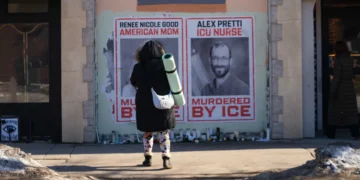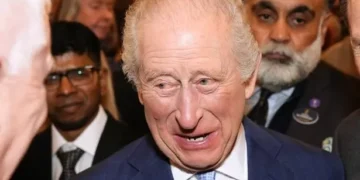As an investigative journalist, Julia Ebner has dedicated her career to uncovering the truth behind violent extremism. With her unique perspective and fearless approach, she has shed light on the dark and dangerous world of radicalization. In a recent interview, she shared her insights on the rise of extremism and the importance of countering it.
Ebner’s journey into the world of extremism began when she was working as an academic. She admits that she was initially hesitant to take on the role of an investigative journalist, as it meant stepping out of her comfort zone. However, she soon realized that this was an opportunity to make a real impact and bring about change.
In her work, Ebner has encountered various forms of extremism, from far-right to Islamist groups. She has witnessed firsthand the tactics used by these groups to recruit and radicalize individuals. Through her research and interviews with former extremists, she has gained a deep understanding of the underlying factors that drive people towards violent ideologies.
One of the key insights that Ebner has gained is the role of social media in the spread of extremism. With the rise of online platforms, it has become easier for extremist groups to reach a wider audience and spread their hateful messages. This has also made it easier for individuals to become radicalized, as they can easily access extremist content and connect with like-minded individuals.
However, Ebner believes that social media can also be a powerful tool in countering extremism. She has seen how online communities and individuals have come together to challenge and debunk extremist narratives. By using social media to amplify positive messages and promote tolerance and understanding, we can create a counter-narrative to the extremist rhetoric.
In her book, “The Rage: The Vicious Circle of Islamist and Far-Right Extremism,” Ebner delves deeper into the similarities between these two seemingly opposing ideologies. She argues that they both thrive on the same grievances and fears, and use similar tactics to recruit and radicalize individuals. By understanding these similarities, we can better address the root causes of extremism and prevent its spread.
Ebner also emphasizes the importance of education in countering extremism. She believes that by educating young people about the dangers of radicalization and promoting critical thinking skills, we can empower them to resist extremist ideologies. This is especially crucial in today’s digital age, where young people are exposed to a vast amount of information, both true and false.
As an investigative journalist, Ebner has faced numerous challenges and risks in her line of work. She has received death threats and has been targeted by extremist groups for her work. However, she remains undeterred and continues to shed light on the dangers of extremism. Her courage and determination serve as an inspiration to others to speak out against hate and violence.
In the face of rising extremism and hate crimes, Ebner’s work is more important than ever. She reminds us that we all have a role to play in countering extremism, whether it is through education, promoting tolerance, or challenging extremist narratives. By working together, we can create a more peaceful and inclusive society.
In conclusion, Julia Ebner’s work as an investigative journalist has been instrumental in uncovering the truth behind violent extremism. Through her research and interviews, she has gained valuable insights into the tactics and motivations of extremist groups. Her work serves as a reminder that we must all play a part in countering extremism and promoting a more tolerant and peaceful world. Let us be inspired by her courage and dedication to make a positive difference in our society.




